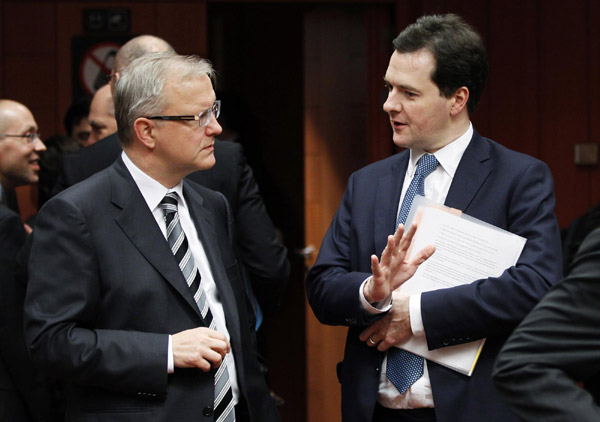Economy
Eurozone agrees funding for future bailout fund
Updated: 2011-02-15 10:00
(Agencies)
|
 European Economic and Monetary Affairs Commissioner Olli Rehn listens to Britain's Chancellor of the Exchequer George Osborne (R) during an European finance ministers meeting in Brussels February 14, 2011. [Photo/Agencies] |
BRUSSELS - European finance ministers decided to provide euro500 billion ($674 billion) for a new crisis fund that will come into force in 2013, but continued to fight over the best way to combat the current debt crisis that has crippled the eurozone over the past year.
The ministers on Monday "agreed on the provisional volume of euro500 billion, which will be revised every other year," said Jean Claude Juncker, the prime minister of Luxembourg who chairs the regular meetings of the 17 eurozone finance ministers.
While Juncker did not say how much money will come from the IMF in the future, the European Union's Monetary Affairs Commissioner Olli Rehn said it was an "unwritten understanding" that the fund would provide 50 cents for every euro spent by the eurozone members.
The European Stability Mechanism will succeed the European Financial Stability Facility, the eurozone's euro440 billion contribution to the overall fund, in 2013.
While the decision on the new mechanism is a big step in showing that the currency union is prepared to stick by its weaker members, immediate investor concern centers on the eurozone's ability to deal with the existing crisis.
Ministers didn't reach a decision on boosting the size and powers of the exciting facility, which at the moment can only give about euro250 billion ($336 billion) in loans because of several capital buffers required to make the bonds it issues to raise money attractive to investors. Juncker said that the euro500 billion promised to the new mechanism will constitute its effective lending capacity and won't be diminished by capital buffers.
Monday's meeting came amid renewed jitters on European bond markets. The interest rates on Portuguese government bonds were near euro-era highs, heightening speculation that the country might soon have to follow Greece and Ireland in seeking international help to service its rising debts.
"The situation on sovereign debt markets remains disturbing," Juncker told reporters. That statement echoed earlier comments from Luxembourg's finance minister Luc Frieden, who said Portuguese yields have been rising "probably because we are too slow in taking the relevant decisions."
His German counterpart Wolfgang Schaeuble, however, cautioned against rushing into new measures. "At the moment financial markets are so stable that it is probably better if we don't disturb them with unnecessary discussions," Schaeuble said.
Eurozone officials have promised to present a "comprehensive response" to the debt crisis by the end of March.
The European Commission, the European Union's executive, and some member states have been pushing governments to give the European Financial Stability Facility new powers -- such as buying government bonds on the open market, stabilizing their prices -- and increasing the facility's funding so it can actually lend out the full euro440 billion.
On top of that, the Commission has suggested lowering the interest rates Greece and Ireland have to pay for their bailouts.
Yet, no decisions were taken Monday on more immediate crisis measures. "Nothing is agreed until everything is agreed," said Juncker.
Specials

Spring Festival
The Spring Festival is the most important traditional festival for family reunions.

Top 10
A summary of the major events both inside and outside China.

A role model
Alimjan Halik had been selected as the "Cyberspace Personality Who Moved the Hearts of the Chinese in 2010".



